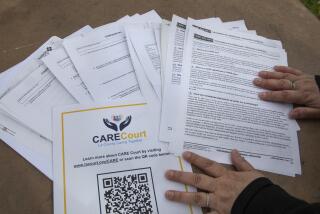Letters: Caring for the mentally ill
Re “A new look at Laura’s Law,” March 10
Allowing court-ordered Laura’s Law treatment for adults with severe mental illnesses can help everyone if done correctly.
The most important part of the article states that people suffering from debilitating mental illness—like Matthew Hoff, who aged out of mental health programs and is now serving time in prison—”may not recognize that they are ill.” Mental illness affects cognition, the ability to think clearly, and people who are severely affected need caring help.
Put the emphasis on “caring” for people who often live in a hell created by misfiring neurons most assuredly not of their choosing, rather than implementing it only for public safety. And recognize that everyone suffers from mental illness to some degree, for no one always thinks clearly.
Julie-Beth Adele
Long Beach
The classic onset of some major mental illnesses, like bipolar disorder and schizophrenia, can occur in early adulthood, a time when parents can have an important influence yet have no legal pull.
The shock of the shift in one’s own behavior, coupled with an age that this culture associates with a fresh independence, especially a break in ties from lifelong caregivers, contributes to the problem.
There remains the intense stigma of mental illness and the impact of coming to terms with or rejecting a life-changing, even threatening disorder. It is unfortunate that laws must be enacted to curb the consequences of these illnesses, but the involvement of those who have known someone for a lifetime is a step in the right direction.
When someone has a severe physical illness, the family is often looked to for guidance, no matter the age of the patient. Why should this be different for those suffering a mental illness?
Kendra Schwartz
San Diego
The implementation of Laura’s Law in Orange County would not necessarily have saved Kelly Thomas from his beating death by police. Local officials who are reconsidering their stance on this law need to focus on the root of the problem.
Whether a county enacts a system that forces mentally ill adults into treatment will not prevent unjustifiable actions like those displayed in the Thomas beating. Law enforcement personnel need to be trained far more extensively in dealing with mentally ill adults.
An officer’s work can be tough, dangerous and thankless. Therefore they too should be mentally evaluated to help recognize and address megalo-maniac tendencies that ultimately jeopardize people’s safety.
Daniel A. Cowell
Monrovia
ALSO:
Letters: Paying big bucks to Big Pharma
More to Read
A cure for the common opinion
Get thought-provoking perspectives with our weekly newsletter.
You may occasionally receive promotional content from the Los Angeles Times.










